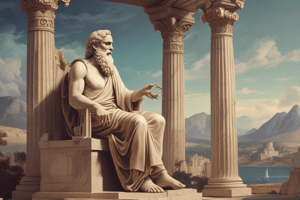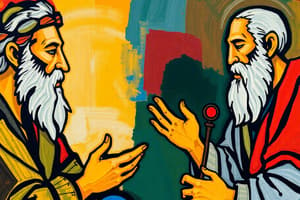Podcast
Questions and Answers
What is the hierarchy of classes in Plato's ideal political state as proposed by Socrates?
What is the hierarchy of classes in Plato's ideal political state as proposed by Socrates?
- Nobles, Commoners, Laborers
- Philosopher-kings, Soldiers, Producers (correct)
- Citizens, Non-citizens, Rulers
- Warriors, Merchants, Scholars
What does Socrates identify as a significant risk of democracy?
What does Socrates identify as a significant risk of democracy?
- Lack of public participation in decision-making
- Possibility of creating benevolent rulers
- Excessive freedom leading to selfish leadership (correct)
- Overreliance on philosophical guidance
In the Ship of State analogy, what does the owner of the ship represent?
In the Ship of State analogy, what does the owner of the ship represent?
- The citizens who vote
- The soldiers who protect society
- The general populace who lacks knowledge
- Philosopher-kings who are fit to rule (correct)
Why does Socrates believe that democracies struggle to find skilled leaders?
Why does Socrates believe that democracies struggle to find skilled leaders?
What outcome does Socrates warn could arise from the flaws in democracy?
What outcome does Socrates warn could arise from the flaws in democracy?
Flashcards are hidden until you start studying
Study Notes
Socratic Critique of Democracy
- Socrates critiques democracy for promoting excessive freedom, which can lead to chaos and a lack of responsibility among citizens.
- He argues that in a system allowing all to rule, selfish individuals can rise to power, undermining the common good.
- Socrates warns that democracy can pave the way for dictators, tyrants, and demagogues, as unsuitable leaders gain influence.
- He highlights that democratic leaders often lack the necessary skills or moral integrity, decreasing the likelihood of competent governance.
Ideal Political Structure
- Plato proposes a hierarchical political system consisting of three distinct classes:
- Philosopher-Kings (Guardians): The ruling class making decisions for the society based on wisdom and knowledge.
- Auxiliaries (Soldiers): The protective class responsible for defense and enforcement of the rulers' decisions.
- Producers: The working class engaged in creating goods and providing services essential for the society's economy.
Ship of State Analogy
- Socrates uses the "Ship of State" analogy to illustrate the problems of democracy:
- A ship owner, who is physically strong but lacks knowledge of navigation, represents the average citizen.
- Sailors, untrained in navigation, debate over who should steer the ship without understanding the craft, reflecting democratic decision-making chaos.
- The persuasive sailor who convinces the owner to let him steer symbolizes the philosopher-king, emphasizing the need for knowledgeable rulers.
Philosophical Foundations
- The concept of a republic in Plato's Republic differs from modern interpretations and emphasizes philosophical governance rather than democratic principles.
- Plato's vision advocates for rule by the knowledgeable elite, asserting that only those with the right understanding should lead society.
Studying That Suits You
Use AI to generate personalized quizzes and flashcards to suit your learning preferences.




